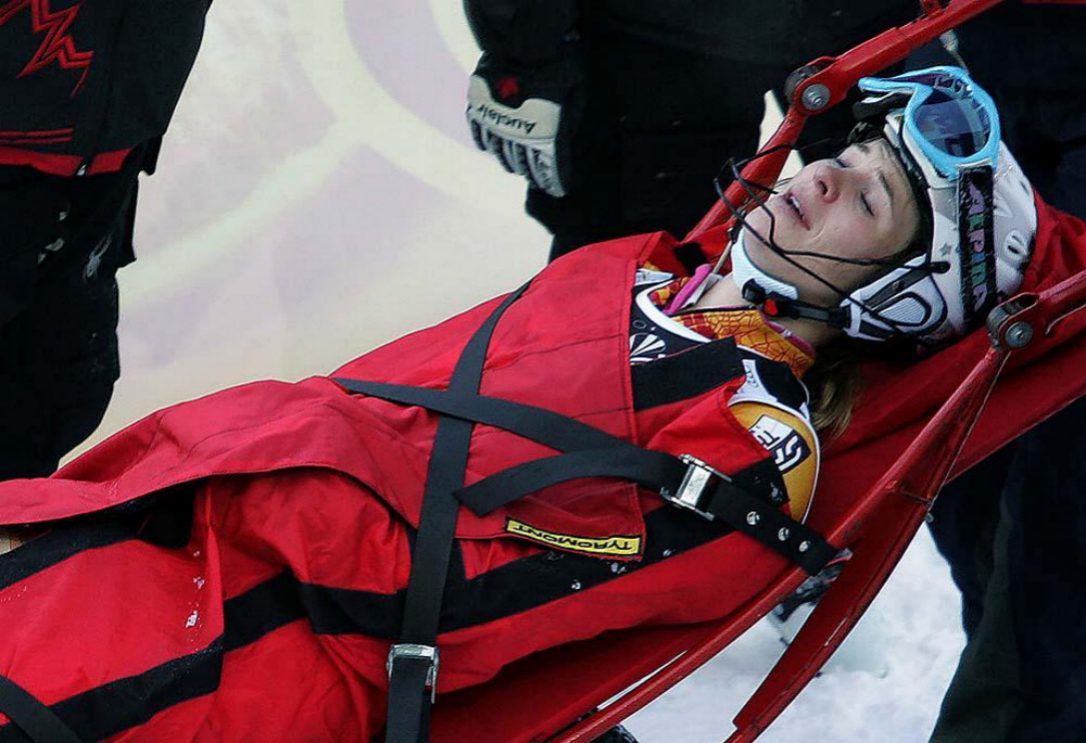
Snap. It was the moment I had been dreading for all of my life as a ski racer. Like a rubber band snapping under too much pressure, I felt my knee give away. The sudden snap was followed by sheer disbelief and heartbreak. A knee that I had trusted, trained, strengthened and depended on for so many years let me down when I needed it most. The inaudible snap boomed through my ears and into my heart. This was it. This was where my luck ended. It was two months before the Olympics for which I had qualified, and I had just torn the Anterior Cruciate Ligament in my knee.
I lay in a debilitated heap on the side of the ski hill in Croatia, at the bottom of the World Cup ski race where I had, just moments before, been competing. Going from full adrenaline and high speed to complete shock and stillness, the transition from being healthy to being injured seemed too abrupt. All I could do in this moment was cry shamelessly for all that I thought I had lost: the olympics, my career, my health, and the only life that I knew up until this point.
My life was ski racing. I had been competing for the past twenty years, from the time I was a tiny kid in local ski races, up until now, as an adult competing on the World Cup Ski Tour. My devotion to the sport was religious. I breathed and ate according to ski racing. I was a nomad that lived out of a musty duffel bag because of ski racing. I didn’t go home for Christmas, Thanksgiving, Easter or even for the summer because of ski racing. I trained in a gym, at a field, or on a mountain every day for ski racing. My mind revolved around ski racing. My friends were ski racing. My family was ski racing. I could not believe that it could be snatched away within that moment of “snap.”
My dream and what I believed to be the most important element in life had just been crushed like a a ripe peach, the juices flowing into nothingness, seeping farther from my grasp. I could not bear to face the reality of my situation.
“I tore my knee,” I told my parents, trying to keep my voice from shaking, over the phone from my Croatian hotel room. They were at home in Canada.
“You’re kidding.” my dad sounded as heartbroken as I felt. At that point I could not longer keep a strong voice and the tears flowed so hard I could barely whimper any more words and I could hear my mom beginning to cry.
“I can’t go to the Olympics,” was the last thing I could choke out.
The reality of my situation sunk in once I was alone in an airport hotel room in Munich. I was scheduled to fly home the following day, leaving my dreams behind in Europe. My teammates, my on-the-road family, were back in our cozy home-base in Austria going about the normal routine: dinner, video analysis, physiotherapy and then bedtime. My family was six hours ahead of European time, sleeping at home. I was surrounded by ugly carpets in a less-than sterile room. My knee was hot and swollen and I was sitting on an itchy comforter choking back tears. I was not ready to leave. I was not ready for my journey to the Olympics to be over. I felt lost.
Since living a life in the spotlight as a professional athlete and possible Olympic contender, I had started a blog many years earlier for my family, friends and fans of ski racing. My blog was usually a way to show off a series of photos and a few comments to boast to the outside world about how amazing my life was. In this moment of darkness, alone in the Munich hotel room, I wrote for all that I believed to be lost. It was the first time that I wrote without caring about what other people might think:
“The hardest part about yesterday was the initial shock of the injury and the end of this season; the hardest part about today was saying goodbye to my team. I hate leaving them behind. They are my unconditional family and I love them, I love being with all of them and I love being on the road with them.”
As suddenly as my life had just changed, so had my blog. I had written something deeper than “how awesome I think my life is” and the influx of support that followed the blog post pulled me out of my self-pity hole and propelled me forward. Who didn’t love a heartbreaking story?
The weeks that followed were consumed by rehabilitation for my knee. My blog became my form of redemption to the life and dreams that I had left behind in a heap on the side of the Croatian ski hill. I did not want to be a self-pity blogger, nor did I want people to feel better about themselves after reading my blog. It was a selfish endeavor but no matter what happened, I wanted to make it look like I was happy, strong, and healing fast enough to race again soon, even if I wasn’t. Through this twisted idea of portraying a happy reality to the outside world, I actually started believing it.
The heartbreak over my injury evolved from a jagged rip into to a softened ache. With each day that passed away from ski racing, a sense of freedom started creeping into my soul. My writing and photography evolved for the sake of my sanity and opened my eyes to things I had not seen or thought about before. I was no longer living out of my duffel bag and having every hour of the day planned out for me. I had my first taste of freedom.
I was intrigued by my new perspectives and reflections away from the only life I had ever known. I missed my teammates, but I did not miss having to try to be faster than them, and constantly being pitted against them everyday in training and every weekend in races. I missed competing, but I did not miss the competition beyond ski racing. Everything from eating, off-hill training, boyfriends, blogs, etc had some sort of competitive element to it and there was no escaping it.
From a distance, the life and dreams that I had left behind upon that fateful “snap” were starting to seem ridiculously self absorbed, controlled, and suffocating. Being so far away from the only life and people that I really knew was shifting my mind away from the only things I knew to be right. Making decisions for myself was like feeding an addiction I never knew I had. When had ski-racing gone from being a sport that I loved to a job without freedom? The feeling of being under constant negative scrutiny where the result was usually inadequacy seemed ludicrous. Like the cold creeping up through my mangled body on the fateful day that I tore my knee, the feeling that winning was no longer my life’s priority was spreading tiny daggers of ice into my heart. I was questioning everything that I had ever known, including my own dreams.
Even though I eventually did make it back from injury and fulfilled my goal of competing at the Olympics, the icy daggers of change had already been rooted into my being. The dream that I had once coveted so dearly now seemed like a political and emotional battle that left me exhausted and emotionally drained. Despite all of the negative energy that enveloped me, I had learned from injury and through blogging that there was always something beautiful to behold no matter what. I found moments of joy and freedom from skiing, not in racing, but in riding a chairlift on a beautiful morning, feeling the fresh crisp air on my face, carving a perfect turn, and through appreciating the respect and admiration shown to me by my teammates. Only I no longer knew whether I loved the racing part as much as I had before the “snap.” My perspectives and dreams had shifted.
When I finally hung up my skis and called it a career, I created a day of celebration rather than a day of sadness. I left with a smile on my face and skis strapped to my feet. I was surrounded by the warmth of my teammates and family, and engulfed by the communal love for skiing. I felt that my accomplishments since tearing my knee no longer had to do with performance, but with amazing friendships, my leadership role on the team, and my sportsmanship. I still loved skiing and tasted no bitterness upon my departure. I was now driven by the beauty of nature, the bond between friends, and the love for adventure. I realized that the cold feeling that only winning could make me happy began to disappear the day I tore my knee. Snap.
